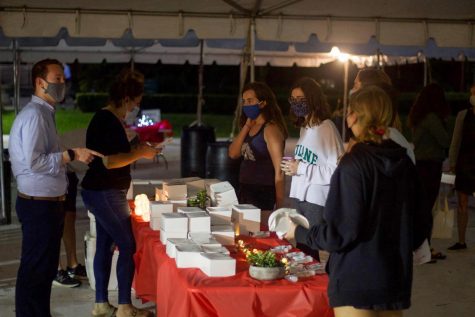Classes held on Yom Kippur unlike previous years
September 30, 2020

In past years, classes have been cancelled for Yom Kippur, an important Jewish holiday that typically falls around mid-to-late September. This year, however, classes were still held. With COVID-19 protocols and class as usual, the holiday looked different this year for students who observed it.
Yom Kippur is the Jewish day of atonement. Jews typically observe the holiday with a day-long fast and services throughout the day, followed by a large meal to break the fast. Tulane Hillel and the Rohr Chabad Jewish Student Center, the two centers for Jewish life on campus, worked to accommodate students who wanted to commemorate the holiday in a safe and socially-distant manner.
Many were disappointed by Tulane’s decision not to cancel classes as they had in previous years, for students of all denominations.
“In order to achieve our goal of completing the semester prior to Thanksgiving, and the possible arrival of a second wave of Covid-19, we had to make the difficult decision of holding classes on Yom Kippur,” said Director of Public Relations Mike Strecker. “Tulane’s ‘Religious Observance Policy’ guarantees that all students can observe religious practices with no adverse academic consequences. Faculty who wish to observe Yom Kippur can reschedule or record their classes scheduled on Yom Kippur. Students can view recorded classes after the holiday. No exams are scheduled on Yom Kippur. We also canceled all breaks other than Labor Day, a federal holiday.”
Some professors chose to cancel class for the holiday, while others held class as usual. If students were unable to attend class because they were observing the holiday, they had the option of letting their professor know without any penalty. However, with class still held as usual, students risked falling behind if they chose to miss class.
“It was a little bit frustrating that we had class this year because the past two years, I didn’t have to consider not fasting, and this year I feel like my classes require attendance, or I also felt like if I didn’t go to class I would be behind, so I had to weigh my options of either going to class hungry and fasting, or fasting, not going to class and catching up,” junior Danielle Glickman said. “I emailed one of my professors and asked if I could attend a different section which was on a different day and luckily she was really accommodating. I would have rathered that there was no class because I’m sure other people had other experiences and were worried about falling behind if they missed class.”
For those who were able to attend, Chabad hosted in-person, socially distant outdoor services on Sunday night, Monday morning and Monday evening. The Saturday evening service was followed by a break-fast meal which was also held outside.
Tulane Hillel broadcasted services over Zoom. Hillel had a limited number of in-person guests for the break-fast meal and also provided to-go bags of food to accommodate more people.
“We’ve got a positive, action-oriented Jewish community in the context of a larger Tulane community here and we respect the University’s ability to determine when it makes sense to cancel classes,” Executive Director of Hillel Ron Gubitz said. “This year, in the midst of the pandemic, we were able to provide an array of options to observe the High Holidays based on what students asked of us.”








Tulane Alummmmmm • Mar 1, 2021 at 1:43 am
Disgusted in Tulane for having classes on Yom Kippur. How about they have classes on Xmas instead?
Richard Lee • Oct 1, 2020 at 9:48 pm
Why the change in policy about Yom Kippur ? Given that it is the holiest day the year and there are a large number of Jewish students and instructors the change is insulting.
It is one of the most important days of the year and a day when it is forbidden to work, use electronics or drive.
Having class disregards the one day that Jews usually observe, above all others.
How about class on Christmas Day ? New Years Day ? ETC.